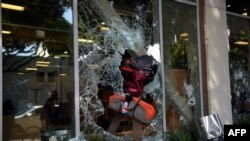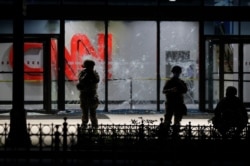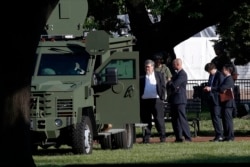The U.S. Justice Department moved swiftly to bring federal charges against 53 individuals accused of violence during nationwide protests that swept across the United States calling for an end to police brutality.
Attorney General William Barr promised a crackdown on members of the anti-fascist movement known as antifa and other “extremists” he blamed for helping to drive the violence.
But a Reuters examination of federal court records related to the charges, social media posts by some of the suspects and interviews with defense lawyers and prosecutors found mostly disorganized acts of violence by people who have few obvious connections to antifa or other left-wing groups.
Reuters reviewed only federal cases, both because of the allegations by the Justice Department about the involvement of antifa and similar groups, and since federal charges generally carry harsher penalties. In some of the charging documents reviewed by Reuters, no violent acts are alleged at all.
The Department of Justice declined to comment on Reuters’ findings and referred to an interview that Barr gave to Fox News on Monday. He said there that while his department had some investigations under way into antifa, it was still in the “initial phase of identifying people.”
Looting and violence broke out at some of the hundreds of largely peaceful demonstrations over the past week sparked by the May 25 death of George Floyd, an African American, after a white Minneapolis police officer pinned him with a knee to the neck for almost nine minutes.
The policeman, Derek Chauvin, has been charged with second-degree murder, and three other officers with aiding and abetting.
While Barr and President Donald Trump have repeatedly singled out antifa, an amorphous movement of primarily leftist anti-authoritarians (the name is derived from “anti-fascist”), as a major instigator of the unrest, the term does not appear in any of the federal charging documents reviewed by Reuters. It is possible that more evidence could emerge as the cases progress.
Only one group was called out by name in a federal complaint: the so-called boogaloo movement, whose followers, according to prosecutors, believe in an impending civil war.
Hate group experts say boogaloo’s followers are largely an assortment of right-wing extremists. Prosecutors alleged three men affiliated with “the movement” plotted to set off explosives in Las Vegas in the hopes of touching off rioting before a protest.
The three suspects are scheduled to appear in federal court on Monday and have not yet entered a plea. Their lawyers did not respond to requests for comment.
No claims of allegiance
In three other criminal complaints, individuals told police about their ideological leanings without claiming allegiance to any particular group.
In Massachusetts, 18-year-old Vincent Eovacious was charged with possession of a Molotov cocktail and — according to the complaint against him — told his arresting officer he was “with the anarchist group.” The U.S. attorney’s office in the state said there was no additional information on what that meant.
His lawyer did not immediately respond to a request for comment.
Another man, Brian Bartels, arrested in Pennsylvania for spray painting and destroying a police vehicle, described himself as “far left” and said he lashed out in a “fuck-it moment,” according to the charging documents. His lawyer, Joseph Otte, declined to comment.
A man in Lubbock, Texas, 25-year-old Emmanuel Quinones, brandished an assault rifle at a protest and shouted: “This is a revolution” and “President Trump must die” as he was arrested, according to prosecutors. He admitted to posting messages on social media aimed at intimidating Trump supporters. Quinones’ attorney declined to comment.
On social media, 17 individuals espoused violence — like threatening to start riots or harm police — or organized themselves using encrypted communications, the complaints alleged. Social media profiles reviewed by Reuters showed a range of views, including anarchism, anti-racism and anti-government messages.
Ca’Quintez Gibson, 26, was arrested for allegedly using Facebook live posts and emoji-filled messages to encourage people to loot in Peoria, Illinois. But John Milhiser, the U.S. attorney in Springfield, Illinois, whose office is prosecuting the case, told Reuters that Gibson had “no connection” with any political group or motive. Gibson’s attorney could not immediately be reached for comment.
Barbara McQuade, who was U.S. attorney for the Eastern District of Michigan during President Barack Obama’s administration, said prosecutors were generally cautious about making allegations based on someone’s ideology, owing to constitutional guarantees of free speech.
Michael German, a former FBI agent and current fellow with the Brennan Center for Justice, said the government could produce more evidence at trial, but the “lack of clear indications of involvement of anti-fascists in these protests I think shows they are not leading in any way the protest violence.”
Still, Trump’s campaign for re-election in November is sending out pleas for campaign donations touting the president’s “100%” stand against antifa.
Molotov cocktails
Most of the individuals charged — about 40 — were accused of violent acts around the protests, from throwing Molotov cocktails to setting fires or looting stores, according to photographs and affidavits included in the criminal complaints.
In the rest of the cases, no serious violence was alleged, Reuters found. Some of those arrested were charged only with possessing illegal drugs or firearms.
One man arrested in Florida, John Wesley Mobley Jr., was charged with impersonating a police officer when he was found carrying a BB gun that looked like a Glock pistol and a fake U.S. Marshal’s badge, according to the federal charging documents.
Mobley had a history of felonies and had impersonated police in the past, the complaint said. His attorney, Karla Mariel Reyes, declined to comment.
A man arrested in Madison, Wisconsin, Kyle Olson, was carrying a loaded handgun, which he said he brought to the protests “for protection,” court records stated. Joseph Bugni, the public defender who is representing Olson, said his client had “no political motivation.”
Another man charged in Wisconsin, Anthony Krohn, was found by police lying intoxicated on the grass near the Wisconsin state capitol with a serious gunshot wound to his leg, which he said he had accidentally inflicted on himself. Krohn’s attorney, Peter Moyers, said his client had “no history of political activism.”
Attorneys for some of the individuals charged said they were surprised the FBI was getting involved in cases that would usually be handled by state prosecutors.
The FBI referred questions to the Justice Department.
The head of the New York Police Department’s intelligence unit, John Miller, told reporters at a briefing there were definitely signs of organized violence by “anarchist groups” that came “prepared to commit property damage” in “high-end stores run by corporate entities” and developed a “complex network of bicycle scouts” to report on police movements.
But none of the eight people charged by the Justice Department in New York were alleged to have ties to specific anarchist groups, according to court papers.
The NYPD did not immediately respond to a request for comment on Reuters’ findings.







